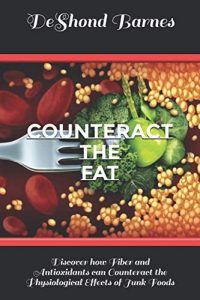Many of us love junk foods. What we don’t love are the medical conditions & weight gain that they are associated with. Research findings made at various institutions indicate that fiber & antioxidants can counteract the physiological effects of junk foods. This does not mean that we can eat unlimited amounts of fat every day. What it does mean is that we can have greater freedom in making food choices. This book is a compilation of these research findings, providing cutting edge information on how fiber & antioxidants can help prevent medical conditions & weight gain associated with high-fat & other unhealthy great-tasting foods. The MANY concepts discussed include:
- High-fat foods produce cholesterol-related acids that can clog arteries & raise cholesterol levels. Fiber counteracts that effect by nabbing cholesterol-related acids & removing them from our bodies, promoting healthy cholesterol levels & reducing our risk of heart disease.
- The excess calories in high-fat foods can increase our risk of obesity. Fiber counteracts that effect by nabbing calories before they can be stored as fat, making it harder to gain weight & reducing our risk of obesity.
- High-fat foods increase our exposure to “free radicals,” which damage human cells. Antioxidants counteract that effect by neutralizing free radicals, preventing & reversing cellular damage & reducing our risk of cancer, heart disease & other conditions.
- The excess calories in high-fat foods increase our risk of obesity. Antioxidants counteract that effect by giving our bodies the energy needed to burn fat more efficiently, making it harder to gain weight & reducing our risk of obesity.
- High-fat foods can trigger heart attacks by causing blood clotting elements known as “platelets” to become more adhesive & clump together, triggering the formation of abnormal blood clots in the heart artery. Fiber counteracts that effect by speeding blood clot-dissolving mechanisms, decreasing the likelihood that abnormal blood clots will lead to heart attacks.
- And MUCH, MUCH MORE!
The book is based on research findings from the following institutions:
The U.S. Department of Agriculture’s Human Nutrition Research Center in Maryland
The Naylor Dana Institute of the American Health Foundation
The University of Minnesota in St. Paul
The University of Florida College of Medicine
The University of Kentucky College of Medicine
The USANA Research Laboratories in Utah
The Cardiology Research Institute in Moscow
The National Institutes of Health
Boston University School of Medicine
The Strang Cancer Research Laboratory in New York
Rutgers University in New Brunswick
The University of Minnesota in Minneapolis
Cornell University Medical College in New York
The University of Toronto
Georgetown University School of Medicine in Washington, D.C.
The University of New Hampshire in Durham
Oregon Health Sciences University
























































